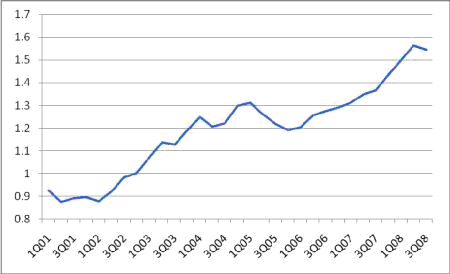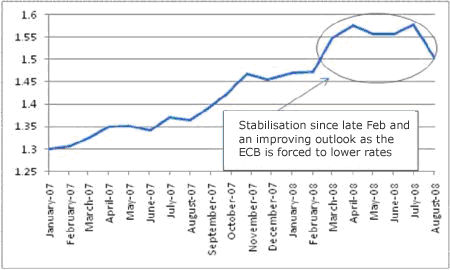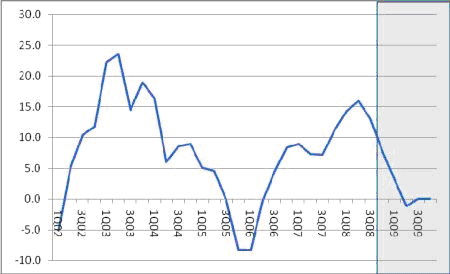Why the rising dollar is bad for tech stocks
As the US dollar sank, American tech companies saw their growth driven by stronger foreign markets. But now that the dollar is on the rise again and European economies falter, multi-national tech firms could be in for a difficult time.
Get the latest financial news, insights and expert analysis from our award-winning MoneyWeek team, to help you understand what really matters when it comes to your finances.
You are now subscribed
Your newsletter sign-up was successful
Want to add more newsletters?

Twice daily
MoneyWeek
Get the latest financial news, insights and expert analysis from our award-winning MoneyWeek team, to help you understand what really matters when it comes to your finances.

Four times a week
Look After My Bills
Sign up to our free money-saving newsletter, filled with the latest news and expert advice to help you find the best tips and deals for managing your bills. Start saving today!
Mediocre at best.
That's how you can sum up the growth rate for the S&P 500 index over the past six-and-a-half years.
In fact, since the end of the first quarter of 2002, the index has risen by a total of 12.8%. That's just 1.87% on an annualised basis, as the following chart shows...
MoneyWeek
Subscribe to MoneyWeek today and get your first six magazine issues absolutely FREE

Sign up to Money Morning
Don't miss the latest investment and personal finances news, market analysis, plus money-saving tips with our free twice-daily newsletter
Don't miss the latest investment and personal finances news, market analysis, plus money-saving tips with our free twice-daily newsletter

Even if you add in the 2% dividend yield, you get a whopping 3.87% return per year.
That might be bad news for companies that do the bulk of their business in the US But multi-national companies have enjoyed some serious benefits during this six-and-a-half year period, as the performance of the euro has pummeled that of the S&P, soaring 73%.
This strengthening euro has dramatically increased the buying power of European technology customers, who pay American companies in euros. And in turn, it's created a great tailwind that may be unwinding...
A rough 2009 for these tech multi-nationals?
As the broader US economy plods along sluggishly and the dollar has sunk, American multi-national companies like IBM (NYSE:IBM) and Accenture (NYSE:ACN)have seen international markets drive their growth.
However, as the combination of weakening European economies and the strengthening dollar eliminate this growth source, companies will have a difficult time meeting analysts estimates for 2009. For example...
Accenture: Revenues from the EMEA region (Europe, Middle East and Africa) increased 23% in US dollars, but only 11% in constant currency. So even without constraints on demand, the revenue growth would be cut in half.
IBM: The company has also benefited from the weakening dollar and stronger euro. Its European business grew at 17.9% in dollar terms, but only 6% in constant currency.
Both Accenture and IBM will see the growth contribution from these regions more than cut in half in the coming quarters at a time where the domestic business is continuing to languish.
In short, 2009 has the potential to be a tough year for multinationals. If the euro/dollar exchange rate holds constant at 1.545 (shown in the chart below), the year-over-year growth of the euro drops to 3.2% in the first quarter of 2009.

So as you can see on the chart below, what had provided a strong tailwind of between 13% and 15% over the first three quarters of 2008 disappears towards the end of the year - the historically weakest period for technology companies and the time that management gives guidance for the forthcoming year.

And this could be the best-case scenario...
Breaking down the bottom-line damage
What if the exchange rate doesn't stabilize in this area? It's very possible that the dollar could continue to appreciate. Considering that the European Central Bank just announced its first quarter of GDP growth contraction and the strengthening dollar has reduced the impact of inflation, we believe there's a real chance of seeing European interest rates decline, while domestic rates remain stable.
How much damage could there be?
- In Accenture's case, EMEA represents 50% of revenue, but since the domestic business is growing more slowly, it's more than 50% of the growth.
- IBM is in somewhat better shape, with 37% of revenue coming from EMEA, but this is still a sizeable portion of both revenue and growth.
The flip side of the strengthening dollar is the benefit to operating expenses. When a company is in business-building mode (and European operations have a lower margin than domestic), this can have a positive impact on profit, despite the negative impact on revenue.
Since companies are not required to break out operating expenses by currency and some engage in hedging programs to reduce the impact of foreign exchange fluctuations, the impact on profit will vary on a case-by-case basis.
So when will this happen?
Tech trouble towards the end of this year as guidance goes awry
The timing for this issue to be incorporated into financial expectations will be either during the third quarter reporting season, or as the end of the year approaches.
Companies typically don't offer guidance for 2009 until the end of 2008, but this trend is large enough that it will be addressed sooner than later.
For example, in its conference call where it issued financial guidance for the coming quarter, Hewlett-Packard (NYSE:HPQ)mentioned that its projections are based on exchange rates as of the end of July and that currency fluctuations could cause revenue to be below guidance.
Management also addressed the profit issue and said that even in the case of a strengthening dollar, the company would meet earnings-per-share projections. This may yet prove to be accurate, but it would come at the expense of potential earnings upside.
Since the end of July, the dollar has appreciated 4.6% versus the euro and considering the market's current volatility, investors should remain more cautious than dismissive of the impact of this trend.
This article was written by Paul Moore for the Smart Profits Report
Get the latest financial news, insights and expert analysis from our award-winning MoneyWeek team, to help you understand what really matters when it comes to your finances.
MoneyWeek is written by a team of experienced and award-winning journalists, plus expert columnists. As well as daily digital news and features, MoneyWeek also publishes a weekly magazine, covering investing and personal finance. From share tips, pensions, gold to practical investment tips - we provide a round-up to help you make money and keep it.
-
 Should you buy an active ETF?
Should you buy an active ETF?ETFs are often mischaracterised as passive products, but they can be a convenient way to add active management to your portfolio
-
 Power up your pension before 5 April – easy ways to save before the tax year end
Power up your pension before 5 April – easy ways to save before the tax year endWith the end of the tax year looming, pension savers currently have a window to review and maximise what’s going into their retirement funds – we look at how

